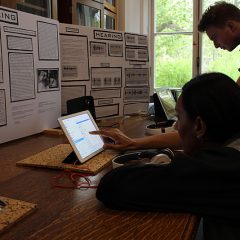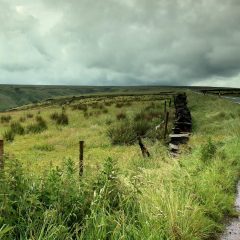Counting Backwards
by Joseph Brooker In 2014 the Centre for Contemporary Literature hosted the world's first symposium on the writer Geoff Dyer. The event was organized primarily by Dr Bianca Leggett. I gave a paper on Dyer's first novel, The Colour of Memory (1989). Recently I was contacted by the US project The Creative Process, which had just conducted an interview with Dyer and wished to publish an essay on his work alongside it. I sent them a reworked version of my essay which now appears here. Image: Brockwell Park by fosbry, used under a CC BY-NC 2.0 licence....
The Contemporary: an exhibition
by Dylan Williams As part of Birkbeck’s Arts Week 2016, participants in the MA Contemporary Literature and Culture staged an exhibition responding to the question ‘What is the Contemporary?’. The disparate variety of the contributions spoke not only of the productive (if not problematic) nature of this question, but also demonstrated the variety of creative expertise and interests enjoyed by the course’s students and staff. Assembled for visitors on Wednesday 18th May, the exhibition somehow managed to pack in the following: a photographic engagement with hybridity in London shopfronts, a live feed of Tweets as they happened, a reading of poetry generated from the experience of contemporary London, an innovative exploration of ways of seeing, hearing, reading and writing, and photography interrogating the role of the computer and the nuclear in our contemporary cultural psychology. At first glance the thematic and formal disparities between the individual pieces served to confound any conclusive definition of ‘the contemporary’. Instead the exhibition constituted a loose assemblage of different artistic adventures spring-boarding from considerations of the term. For Terry Smith ‘contemporary’ is a word so variously used that it has become ‘empty as a signifier’. [1] The exhibition was a positive response to Smith that embraced the floppiness of the term. The attitudes of the different practitioners to their wider cultural context demonstrate this. Adopting modes of witnessing, reassessing and de-familiarising the pieces served to flag-up more and more cultural material for consideration under the banner of the ‘contemporary’. The signifier was loaded up rather than worked out. The exhibition, in other words, sought to stretch and requalify the concept – to make it new. This says something about the nature of studying ‘the contemporary’. In few other places in the Humanities can we find a term so temporally and materially mobile. Despite their problems terms like ‘modern’ and ‘postmodern’, and while we’re at it ‘medieval’ or ‘Renaissance’, all point the scholar towards largely periodized and packaged-off areas of cultural attention. The ‘contemporary’ is different. It is a term continuously ‘under construction’, without lasting temporal borders or a complete canon. Opening itself to innovations in culture as they happen, the term can never be closed off. Scholars of the ‘contemporary’ operate on constantly shifting sands. The practitioners behind the exhibition at Birkbeck demonstrate a way of coping with, and indeed harnessing, the instabilities of this area of study. By eschewing any sort of grand characterisation of the ‘contemporary’, the artists urged the viewer into an alternative mode of critical reception. Differences, rather than trends, were the order of the day, and were urged on the viewer as the main focus for attention. Echoing...
Call For Papers: Transitions 7
We are pleased to announce the Call For Papers for TRANSITIONS – New Directions in Comics Studies at Birkbeck College, London, on Saturday November 19th 2016. Organised in collaboration with Comica – London International Comics Festival, Transitions at Birkbeck College is unique in offering a regular comics studies symposium and meeting point in London, a platform for emerging research at an event that is free of charge and open to all. Originally convened by PhD students in 2009, Transitions has become an annual fixture in the UK comics scholars’ calendar. We are still especially supportive of postgraduate and early career presenters, but open to any new and ongoing research in our field. Our aim is to provide a platform for debate and a space from which further collaborations can emerge, to further strengthen our area of study and academic community, and to support connections between comics scholars working in diverse academic departments and contexts. We welcome abstracts for 20 minute papers, or pre-constituted panels of three, on topics including, but not limited to: – comics, comix, graphic novels, manga, manhwa, bande dessinée – superheroes, genre comics, religious comics, documentary comics, children’s comics – politics of representation in comics, formal approaches, trauma and comics, transgressive comics, propaganda and comics – readers and fandoms, creators, publishing histories, transnational approaches, comics and the law, web-comics and comics exhibitions Alongside traditional panel presentations we would like to trial the more interactive format of a 20-minute workshop, potentially as a way of data collection and/or feedback on research-in-progress. Please indicate your preference by stating PAPER or WORKSHOP following your abstract title. You can apply by email to: transitionssymposium@gmail.com. Please attach your abstract of 250-300 words plus short biographical note (preferably as a Word document), indicating ‘abstract’ in the email subject line and your name in the file’s title. The deadline for submissions is August 26th 2016. With best wishes, The Transition Team Image: John Miers for...
Conference Report: True Crime Fictions
by Joseph Brooker In Absolute Power (1997) Clint Eastwood plays a burglar who laconically states: ‘I love true crime’. I always found it entertaining that Eastwood’s next film as an actor was called True Crime (1999). These were fictions referring to a genre of non-fictional narrative, which capitalizes on a public appetite for details of crimes that have really taken place. The critic Mark Seltzer has written a major work on the genre, describing it as ‘crime fact that looks like crime fiction’. But what about ‘true crime fiction’? What does that look like? Our interest in staging a conference on the topic arose in part from the work of co-organizer Dr Mark Blacklock, who had published his own true crime novel and had become aware of a growing field of such works. With generous support from the Birkbeck Institute for the Humanities, Blacklock and I set up True Crime Fictions at Birkbeck to hear what others had to say about the area. We were gratified to find exciting proposals coming in for papers at the conference, which, as Blacklock said at the outset, continues an exploration of genres and genre hybridity that has been recently undertaken at Birkbeck. In this report I will offer a brief record of the conference as I saw it. Our first panel was on ‘Northern Crimes’. Het Phillips (University of Birmingham) started the conference with an exceptionally interesting and eloquent discussion of materiality in true crime. While Phillips drew in a wide range of references, mentioning crime writing from the Moors Murders to David Peace, what most struck me was her emphasis on detail as a textual feature of crime writing. Detail might be a literary relative of the detective’s ‘evidence’; reading could be forensic attitude. Phillips referred not just to Roland Barthes’ account of detail in ‘The Reality Effect’, but even, strikingly, to Hugh Kenner’s discussion of material details in Joyce’s Ulysses. Martin King (Manchester Metropolitan) continued with a paper that was very different in form yet equally engaging. Referring to co-written papers that he had produced from his base in health and social care, King’s approach was oriented to social science and media studies. His focus was particularly on David Peace’s Nineteen Seventy-Four and the TV dramatization Red Riding, and on the versions of masculinity explored in both. One of King’s suggestions was that Peace cannot be wholly separated from a more prurient representation of gruesome crime. What Mark Blacklock called ‘culture industry questions’ – where is a fiction situated, who is the audience, whom does it benefit, is there profit to be made? – come into play. Helen Pleasance (York...





Recent Comments